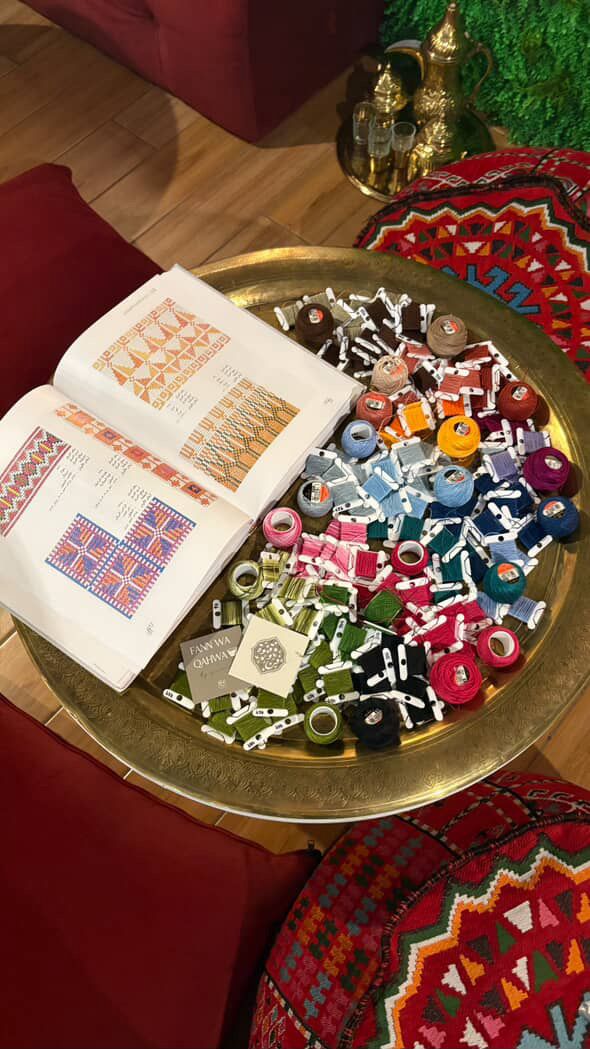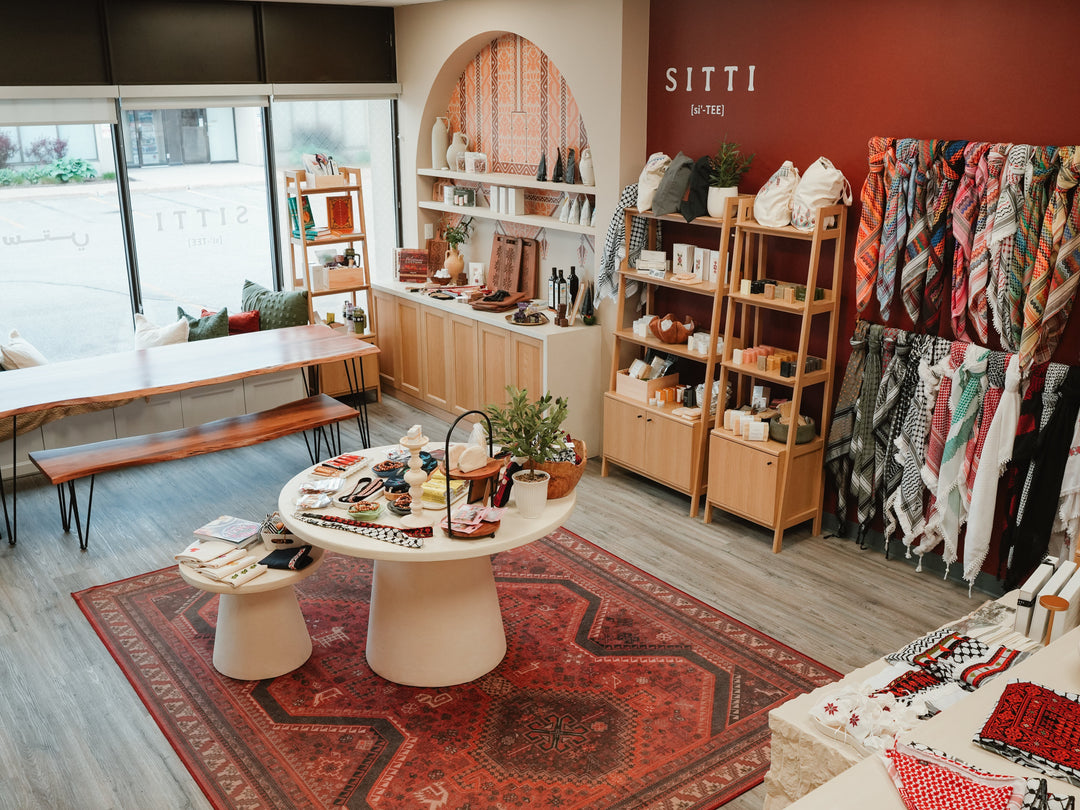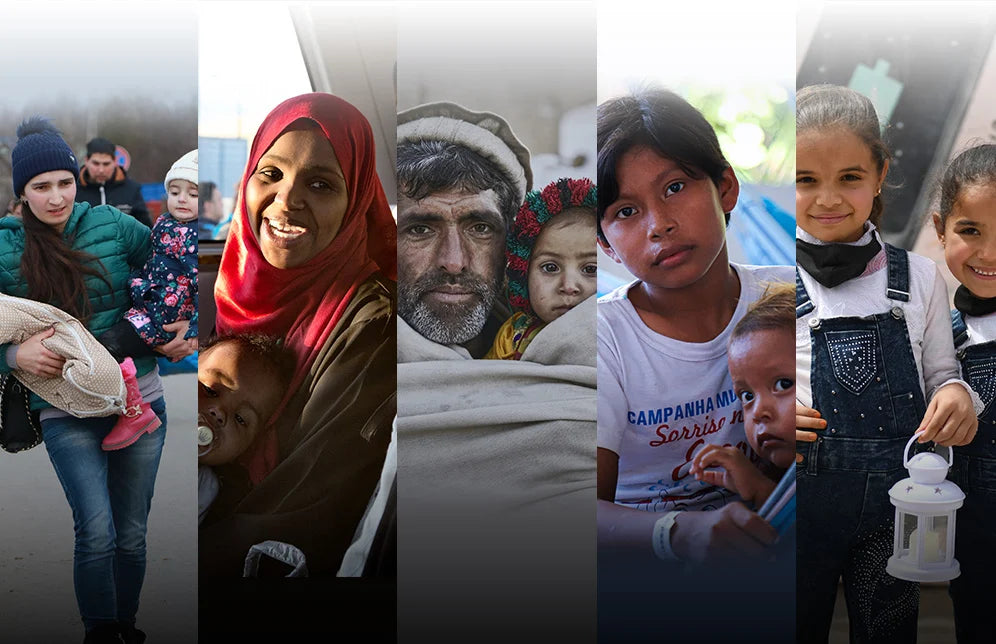Sips with Sitti: S1 E1: "Making It"

Sips with Sitti is our new IG Live series where we- Jackie and Noora - are going to speak with honesty and vulnerability about critical topics for the every day, mindful consumer. We’ll dive into the issues that we should all be talking about and acting on:
- Women in the social enterprise “making it” in the pandemic and post-pandemic economy
- Artisans whose refugee experiences inform, but do not define, their stories
- Moving beyond the $5-a-day budget: discussions around severe socioeconomic inequities (i.e. people living on less than $5 a day), and how we can change these inequities through social enterprise
- Mental and financial well-being in a consumerist society
Join us! Sign up for our newsletter to be notified of our upcoming Sips with Sitti episodes. Listen-in and take part in meaningful conversations every month.
Today- in the first of our Sips with Sitti series - we’re sitting down together to talk about “making it” in the pandemic and (hopefully!) soon-to-be post-pandemic economy. We’re going to talk a little bit about our own experiences- personal and professional challenges of keeping a small social enterprise running throughout the coronavirus pandemic.
So, let’s start! I’ve got my coffee...and I think it’s a good place to start on a day (or week) that we all feel like was another life ago. It was the middle of March 2020….and I just want to reflect on where we were each at with Sitti, with our lives personally a little bit (because they were in very different places at the time- geographically, with family, and so on)...
The separate yet distinct experiences of both women becoming infected with COVID-19 while keeping Sitti running:
- Several women, including ourselves, came down with COVID19 (women were instructed to do all the things that were internationally accepted in terms of protocols)
- For a small business, and someone key to the team gets sick, everything gets put on pause
- It was “surreal”
- How does an experience like this change how we do business? How did it impact our approach to physical and mental health for ourselves? Our team?
It’s safe to say that we - the whole world in - experienced loss in many forms during the pandemic. And we want to talk more about that, and what helped both of us, and our team, survive and grow - take something of value- from those losses.
- The experience of COVID19 in the community compounded all the health and environmental health complications
- The passing of a team member, the grief that rippled throughout our team.
- **Immediately, everything changed about us being a business. We had to be “human” first before a business. Paused, reflected, and acted from a human perspective, before acting from a business perspective.
- When you are such a close lean team, you can’t just continue business-as-usual.
- Time to mourn was important.
- The concept of the “triple bottom line” was amplified.
- Impact of loss on business operations. (i.e. delays, everything gets put on pause)
What strategies helped us to remain a self-reliant and resilient small business, even while more established businesses started closing their doors?
- Creating new policies/protocols. Discussions around a piece of paper vs. the actual cultural response to these policies and procedures and the community education.
- environmental limitations/socioeconomic limitations of living in a camp during a pandemic
- Jumping into action at the beginning of the pandemic. Sense of urgency for us as a business. We were literally the only source of income.
- It wasn’t like “let’s keep our business open for the sake of keeping the brand alive.” It was “we need to keep our team alive.”
- We had to make quick decisions to pivot our model: we made serious marketing and communications decisions. We tapped into our strengths as a soap company in the middle of a pandemic, where handwashing was becoming a priority.
- We took risks looking at other opportunities /taking risks was important
“We started making this series to have a discussion about the pandemic and how it interferes Sitti's business model, to have a more communal conversation with our community that grew amazingly over the course of that first pandemic year. To talk about what is a social enterprise and to have the opportunity to clarify some misconceptions about it.”Jackie started by stating in the beginning of the episode, and Noora complemented with: “Today we will focus and talk about being a social enterprise during a pandemic, literally in the “belly of the beast for a business like ours”.
“When pandemic hit, we taught it would be a 2-week thing, but we soon realized this would be a much longer issue, so we quickly meet with our team in Jordan. When lock-down started we wanted to assure the safety of our staff, our priority was the situation on the ground, because in the refugee camp, 3.000 people lost their jobs at the beginning of the pandemic, and there was an outcry of help messages to us, for donations, because most of the programs that were active in the refugee camp closed, but Sitti partnered with the other program that stayed active throughout the pandemic, which is called KUVRD and we were able to raise $19.000 to help over 1,000 families with food and hygiene kits at that moment”. Noora explained the situation in the refugee camp when 2019 Pandemic hit.
“...we wanted to make sure our team was safe and that nobody would lose their jobs, and we were trying to grasp everything at the same time... and there were no benchmarks to show to us how do you handle situations like this...” Jackie added the information that this moment was also new for them, as business leaders, there wasn’t instruction on how to deal with a situation like this anywhere, no step-by-step best practices or even anything applied for this kind of business model.
“Being a social enterprise, it’s a triple bottom line really, is not just about profit, although profit is key for us as a business, we can’t make a driven economy without that, but you also really need that same level of importance and critical commitment to the people you are working with and to the ecosystem you are working in, and the ecosystem we work now is the refugee community, where more than 50% residents live below the national poverty line.” Jackie explained the threshold of being a social enterprise and added: “The pandemic made this a critical moment to us when everything was amplified, the challenges that we created Sitti to address were suddenly much bigger”.
About COVID, Jackie shared that: “...people don’t realize how serious COVID is until you get it, we moved to California and got COVID on the trip. My husband has a spinal cord injury so we were very concerned with his case, it knocked us out mentally because we were 2 weeks completely out of it, scared, and it added stress to everything we were doing at Sitti because we were in the middle of starting to address the issues at the refugee camp because of the 2019 Pandemic”.
Noora noted that she also got COVID after Jackie: “A month later (in December) my family got COVID as well, so everything was put on hold. We put out a notice on all communications platforms that we would delay fulfillment until the second week of January because we needed to recover as a family. It impacted our cognitive capacity, our sense of taste and smell, so we quarantined for 3 weeks”. And Noora also shared that the situation in the refugee camp was very different...“We had friends and family helping us during that time. We are lucky we had this support system around us, to help us out during COVID. But the reality of someone getting COVID in the refugee camp was very different than ours. Their isolation would be very difficult to happen, the homes they live in are supper tight condensed, multi-generational families living together in one place, you really can’t isolate yourself because several people slept in every bedroom. Their available health care is also limiting, they can’t cover hospitalization charges or tests, so we know this situation was very difficult for them. It was an incredible mental toll for them, and the toll in the community they live in, with added anxiety and stress”.
“We lost an artisan member for COVID, which was sad and numbing. She was the manager, a mother figure to everyone, so we started having Wellness meetings with the Jordan refugee camp team to always know what they need, what is missing, and what we can do as a leadership team to support them. Noora complemented.
“During the 2019 Pandemic families couldn’t grieve properly and we could not participate in any gathering as social distancing restrictions were happening. How to mourn the loss of someone close to you without saying goodbye properly? Jackie also noted this was a difficult moment for all of Sitti employees.
Jackie explained that in a refugee camp: “The mental health of your ground team depends on the leadership to step up because you can’t expect people to address their mental health when they are concerned about keeping their jobs. So the workspace turns into a safe space for them to connect and feel part of something stable and secure, which at that moment was very important”. “At the refugee camp, being able to feel safe and connected is a matter of survival really because they can’t leave, they don’t have Netflix or outside resources to distract themselves of their worries and on top of that a lot of them lost their jobs”. For example, this business model was the lifeline for the rehabilitation center “volunteers” because that was the only help all they had during the 2019 Pandemic, crucial because most of them were the sole income of their households”.
"That is a great ETHOS that we follow and in the case of the refugee camp, we don’t mid-working with other organizations and welcome new ones because there will always be enough work for everybody." Jackie concluded.
Questions & Answers
Q: How do you balance life x work responsibilities specifically during the pandemic?
A: “With a lot of communication” - Jackie said. “Noora was a new mother with 3 kids at home and the pandemic hit”. “You are faced with situations that just need to let go.” said Noora as she gave the following example: “I needed to make a pitch competition in the camera for 200 people for Sitti or breastfeed because my newborn daughter started to cry?”
Q: How a small team can move on during these challenging times?
A: Jackie promptly started and Noora complemented at the same time: “We are a mission-driven approach to everything, we are very passionate. We participated in a virtual Middle East Incubator program from Dubai and had meetings in the middle of the night, we had partnerships with the retainer in Middle East called THAT store, we participated in the ELLA accelerator program virtually, we were the winner of the Impact fund program, and the Founders Fund selected us as well, we won the Mississauga pitch competition in December 2020, the top prize, and were the Canadian Sheeo Venture 2021 semi-finalists, we also won a grant from the Canadian Women’s Foundation as part of the Investment Readiness Fund to launch local projects of people of colour in Ontario, and it all allowed us to expand employment opportunities in Jordan and here in Canada”.
“Despite the hardships, we were really laser-focused on how we could continue to push forward. I think in the end is really about really believing the mission and continuing to tell our story by creating a bigger impact.”
Noora explained that: “We also had rejections and that is normal because maybe we weren’t ready yet, it’s hard and upsetting to be rejected but we realize that is the process in applying that allowed us to learn a lot, whether it’s an accelerator program, a funding pitch, we go through a process that teaches us a bit about ourselves and allows us to prepare differently for our business and to give it a long term perspective and allow us to dive into our numbers a little more, but yes, we take hold of the journey, don’t mull over the things you didn’t achieve but mull over the things that got you where you're today. Take a moment to appreciate it, pad yourself in the back, and keep moving”.
Watch the full episode here.





Leave a comment